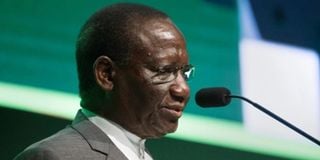Premium
DR Congo PM Sylvestre Ilunga resigns after impeachment

A file photo of DR Congo’s Prime Minister Sylvestre Ilunga Ilunkamba, who resigned on January 29, 2021.
What you need to know:
- Mr Ilunga was dismissed by the vote of parliamentarians on Wednesday, as 367 of the 500 deputies in Parliament voted for the removal of the Prime minister and his government.
- On Wednesday, he angrily said he did not recognise the authority of the assembly's provisional bureau, which oversees legislative affairs, to organise a censure vote.
Kinshasa,
DR Congo’s Prime Minister Sylvestre Ilunga Ilunkamba resigned on Friday, a day after the National Assembly censured him for incompetence.
He and his team will manage current affairs until the next government is appointed.
Mr Ilunga was constitutionally required to resign after being censured by the National Assembly on Wednesday.
He is a close ally of former President Joseph Kabila whose supporters have tussled with President Felix Tshisekedi since he took office two years ago
Presidency spokesman Giscard Kusema said it was "too soon" to say when President Tshisekedi would appoint the next PM.
The presidency confirmed Mr Ilunga's departure on Twitter.
He was dismissed by the vote of parliamentarians on Wednesday, as 367 of the 500 deputies in Parliament voted for the removal of the Prime minister and his government.
Members of Parliament listed several grievances against the Prime Minister, including poor governance, the inability to resolve the issues that the country faces, including insecurity in the eastern part of the country.
Political situation
Mr Ilunga officially handed his resignation to President Felix Tshisekedi on Friday evening, according to the presidency.
In a brief statement at the end of his audience with the President, he said, "As a statesman, I drew the conclusion from the evolution of the current political situation."
He thanked the head of State as well as former President Joseph Kabila, who proposed him for the post of Prime Minister.
President Tshisekedi is now free to appoint a prime minister from his own parliamentary majority.
Since Thursday, the Congolese head of State has had a majority in the National Assembly. Some 391 deputies have joined his camp, which has 500 national deputies.
President Tshisekedi plans to set up a new government after the announcement he made in December 2020 to end the FCC-CACH coalition.
Several FCC (pro-Kabila) members including some ministers and deputies have joined the camp of the President who is trying to implement his own governance programme for the rest of his term.
Mr Ilunga, 73, was appointed by President Tshisekedi in May 2019 under a power-sharing deal that he and Mr Kabila struck when handing over the presidency -- the first peaceful transition in the Democratic Republic of Congo's history.
Mr Kabila's decision to step down after 18 years in office opened the way to elections in December 2018 that were controversially won by President Tshisekedi, the son of a veteran opposition leader.
But on the same polling day, a strong pro-Kabila majority emerged in the National Assembly, preventing Mr Tshisekedi from having a grip on all the political levers of power.
Brawls in parliament
President Tshisekedi was forced into a coalition -- a leviathan of a government with 65 ministers, two-thirds of whom were from the pro-Kabila Common Front for the Congo (FCC).
Tensions swiftly grew and erupted into the open last October when Mr Tshisekedi appointed three judges to the Constitutional Court, the highest judicial authority in DRC.
As the row escalated, Mr Tshisekedi declared his reform agenda was being blocked and launched three-week national consultations to seek a way out of the impasse.
On December 6, he announced the end to the coalition.
He said he planned to seek a new government supported by the National Assembly, a move that sparked brawls in Parliament.
President Tshisekedi's proposed "Sacred Union of the Nation" wields support from 391 lawmakers, according to an envoy, Senator Modeste Bahati, who was appointed to try to forge a majority.
Ilunga's criticism
Mr Ilunga on Wednesday angrily said he did not recognise the authority of the assembly's provisional bureau, which oversees legislative affairs, to organise a censure vote.
In a statement on Thursday, he reiterated that criticism, but said, "I am bound to recognise the competence of the National Assembly to examine the motion of censure" as the motion had been previously signed by 301 MPs.
A vast country the size of continental western Europe, the DRC has a notorious reputation for corruption, poor governance and inequality, despite its mineral riches.
Mr Tshisekedi campaigned on promises to change this and improve the country's poor record on human rights, but he has been to a large degree overshadowed by the figure of Kabila.
Still only 49 years old despite his long years in office, the ex-President retains extensive clout through allies in politics, the military and business.
He took the helm of the country in 2001, succeeding his father, Laurent-Desire Kabila, who was assassinated by a bodyguard.






